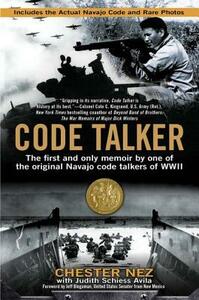Take a photo of a barcode or cover
emotional
informative
reflective
slow-paced
I don't normally love war memoirs, but this was fascinating. It was a look into the life of a Navajo pushed between conflicting cultures. I loved the details like his half-Anglo, half-Navajo wedding and his cleansing ceremony to help with PTSD after the war. Really interesting and fresh book.
I’m torn on this one, because it’s such a fascinating topic and an important story to be told, but the writing felt so flat. It’s an “as told to” book, mostly a straightforward summary retelling of events, with a few sections where it seems the writer felt more info would be helpful, so she did some research and then shoehorned it in at the applicable spot in Chester’s narrative. With memoir or autobiography, I like to have more reflection on the meaning of the events being related, something beyond just “this is what happened.” That’s what was missing from this—and while I’m glad I read it, because it’s a fascinating piece of history, I wish it had been handled by a more skilled writer who could have shaped Chester’s story a bit more thoughtfully and reflectively.
informative
slow-paced
I learned more about life as a Native American in the 20th century than of WWII. At least the Marines were open minded enough to actually utilize these men for their skills rather than as cannon fodder.
Glad I read this. I went in with the wrong expectations that this would be a war book. It wasn't. It was a book about life.
First hand account of the Navajo Code Talkers of WWII. Excellent read! I had never heard of the Navajo Livestock Reduction done by our government in the 1930s, which Chester Nez lived through and still volunteered to serve. Amazing journey.
A (highly personal) memoir, in the truest sense of the word, but also an utterly fascinating peek into an extraordinary footnote in military (particularly WWII, Pacific Theater) history. The book contains more than enough informative history to satisfy military history buffs, the author's experiences make a cat's nine lives seem modest, and the author sprinkled the book with sufficient seasonings (or tastes and reminiscences) of Navajo culture, religion, philosophy, and ... well ... beauty and grace, to make the whole experience worthwhile.
An extraordinary tale of what could have been an incredibly ordinary, unobserved life ... that, instead, is remarkable not only for how far the author traveled, what he (and his colleagues) accomplished, how long he was (and his colleagues were) prohibited from telling his tale, and how the human condition - at a different time and place - in a different culture animated by different religious beliefs - filled with joy and sorrow and love and loss - makes for a remarkably compelling life story.
As for the book, the highly personal nature of the narrative is, arguably, its greatest strength and its most profound (and potentially distracting) weakness. First and foremost, I'm pretty sure that, if I had ever had the opportunity to meet Chester Nez, I would have like him and enjoyed sharing a meal with him. And there's no doubt that I came to respect him. But his remarkable life didn't prepare him to write history (let alone literature), and I fear his co-authors tried too hard to permit his voice and tone to ring true. It's admirable, to a certain extent, but it ultimately renders the book uneven with more neither-fish-nor-fowl (not quite history, not quite biography, not simply a memoir) for my tastes. In other words, if, for example, you're a serious military history (particularly academic military history) reader, this may drive you to distraction. But - to be fair, for better or worse - it is (transparently and accurately) billed as a memoir.
I remember hearing and reading about Nez a number of years back, when the book was first out - and I don't recall why I didn't buy/read the book at the time. Here's a taste of some of coverage: http://www.npr.org/2011/11/28/142849647/navajo-code-powerful-as-any-weapon-in-wwii. Nor do I remember why I didn't read it after Nez passed away, and he was again in the mainstream media: http://www.cnn.com/2014/06/04/us/navajo-code-talker-obit/index.html. (OK, OK, I never saw the movie Windtalkers, and I understand I didn't miss anything.) In any event, I'm glad I finally got around to reading the book.
As an aside, if you're fascinated with the Nazi Enigma code, Alan Turing, Bletchley Park, Ultra, or, for example, the (nicely done) somewhat recent Imitation Game movie, this story, the author's life, and this book, represent the most polar opposite experience imaginable. That doesn't make it any more or less important or interesting - it's just completely different, in every conceivable way.
An extraordinary tale of what could have been an incredibly ordinary, unobserved life ... that, instead, is remarkable not only for how far the author traveled, what he (and his colleagues) accomplished, how long he was (and his colleagues were) prohibited from telling his tale, and how the human condition - at a different time and place - in a different culture animated by different religious beliefs - filled with joy and sorrow and love and loss - makes for a remarkably compelling life story.
As for the book, the highly personal nature of the narrative is, arguably, its greatest strength and its most profound (and potentially distracting) weakness. First and foremost, I'm pretty sure that, if I had ever had the opportunity to meet Chester Nez, I would have like him and enjoyed sharing a meal with him. And there's no doubt that I came to respect him. But his remarkable life didn't prepare him to write history (let alone literature), and I fear his co-authors tried too hard to permit his voice and tone to ring true. It's admirable, to a certain extent, but it ultimately renders the book uneven with more neither-fish-nor-fowl (not quite history, not quite biography, not simply a memoir) for my tastes. In other words, if, for example, you're a serious military history (particularly academic military history) reader, this may drive you to distraction. But - to be fair, for better or worse - it is (transparently and accurately) billed as a memoir.
I remember hearing and reading about Nez a number of years back, when the book was first out - and I don't recall why I didn't buy/read the book at the time. Here's a taste of some of coverage: http://www.npr.org/2011/11/28/142849647/navajo-code-powerful-as-any-weapon-in-wwii. Nor do I remember why I didn't read it after Nez passed away, and he was again in the mainstream media: http://www.cnn.com/2014/06/04/us/navajo-code-talker-obit/index.html. (OK, OK, I never saw the movie Windtalkers, and I understand I didn't miss anything.) In any event, I'm glad I finally got around to reading the book.
As an aside, if you're fascinated with the Nazi Enigma code, Alan Turing, Bletchley Park, Ultra, or, for example, the (nicely done) somewhat recent Imitation Game movie, this story, the author's life, and this book, represent the most polar opposite experience imaginable. That doesn't make it any more or less important or interesting - it's just completely different, in every conceivable way.
Chester Nez’s story has two fascinating parts, the experience of being a Navajo in the 20th century and his wartime service. His descriptions of the land and way of the Navajo on the Checkerboard are sometimes lyrical. The difficult life at boarding schools and the prejudice that he experienced are good reminders of the US’s horrible treatment of Native Americans.
His recounting of how the code was developed by the original code talkers is fascinating. His personal experiences in war gave me a real feel for what US troops experienced in the South Pacific.
His comment that his own children are not fluent in Navajo is sad.
His recounting of how the code was developed by the original code talkers is fascinating. His personal experiences in war gave me a real feel for what US troops experienced in the South Pacific.
His comment that his own children are not fluent in Navajo is sad.
The co-author did a wonderful job of capturing Nez's voice. It felt like sitting and listening to someone tell stories, but with footnotes for context.
I loved the Navajo cultural aspects, what Nez's life was like growing up, the ceremonies he went to, how he took that with him to war. Indeed, I would have liked more on that, and less war, but appreciated the details we got. It was also pretty political, outlining the wrongs done to the Navajo in a matter of fact way.
The Pacific Theatre took up the bulk of the book, which was fair as that's what most people are here for, and the author did a good job of setting up context for what was going on. It worked to follow the story, but was from the PoV of a marine at the time. Which makes me interested in reading more about it from a broader perspective. The battles and military life were very well written though, and gave a strong impression of what it was like to life through that.
I probably would have liked a bit more of the code, though the author gave a good explanation of how it worked. I'm not sure how good at Navajo the audiobook reader was, but it was really cool to hear in any case.
Fascinating read all around.
I loved the Navajo cultural aspects, what Nez's life was like growing up, the ceremonies he went to, how he took that with him to war. Indeed, I would have liked more on that, and less war, but appreciated the details we got. It was also pretty political, outlining the wrongs done to the Navajo in a matter of fact way.
The Pacific Theatre took up the bulk of the book, which was fair as that's what most people are here for, and the author did a good job of setting up context for what was going on. It worked to follow the story, but was from the PoV of a marine at the time. Which makes me interested in reading more about it from a broader perspective. The battles and military life were very well written though, and gave a strong impression of what it was like to life through that.
I probably would have liked a bit more of the code, though the author gave a good explanation of how it worked. I'm not sure how good at Navajo the audiobook reader was, but it was really cool to hear in any case.
Fascinating read all around.





